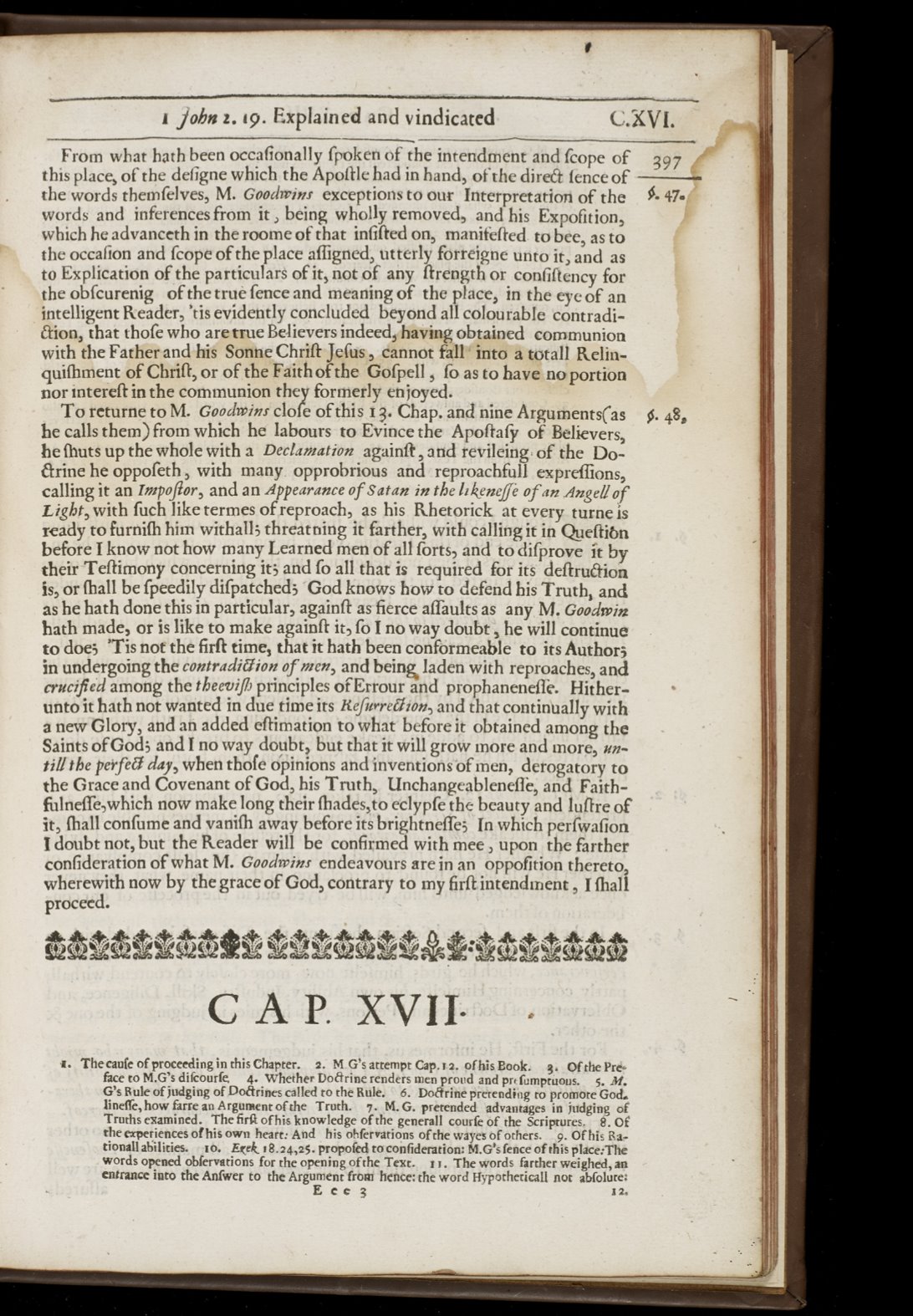

l<
job:
x. 19.
Explained and vindicated
C.XVI.
From what bath
been occafionally fpoken
of
the intendment
and
fcope
of
397
this
place,
of
the
defigne which
the
Apoffle
had
in
hand,
of
the
dire&
knee
of
the
words themfelves,
M. Goodwin:
exceptions
to
our Interpretation
of
the
¢
47.
words and
inferences
from
it,
being wholly
removed,
and
his
Expofition,
which he
advanceth
in
the roome
of that
infifted
on, manifefted
to
bee,
as
to
the
occafion
and
fcope
of
the
place
afliigned;
utterly
forreigne unto
it,
and
as
to Explication
of
the particulars
of
it, not
of
any ftrength
or
confiftency
for
the obfcurenig
of
the
true
fence
and
meaning
of
the
place,
in
the
eye
of
an
intelligent
Reader,
'tis
evidently concluded beyond all colourable contradi-
&ion,
that
thofe who
are
true
Believers
indeed, having obtained communion
with the Father and
his
Sonne Chrift Jefus
,
cannot
fall
into
a
totali Relin-
quifhment
of
Chrift,
or
of
the
Faith
of
the
Gofpell
, fo
as
to have
noportion
nor
intereft
in
the
communion they formerly enjoyed.
To
returne to
M. Goodwin:
clofe
ofthis
i
3.
Chap. and nine Arguments(as
Q.
48,
he
calls
them)
from which
he labours
to
Evince
the
Apoftafy
of
Believers,
he
(huts
up the whole with
a Declamation
againft, and
revileing
of
the
Do-
&rine he
oppofeth,
with many opprobrious and reproachful)
expreffions,
calling it
an
Impoflor,
and
an
Appearance
of
Satan in
the
lrkenef
e
of
an
Angell
of
Light, with
fuch
like termes
of
reproach,
as his
R.hetorick
at
every
turne
is
ready
to
furnifh him
withall;
threatning
it farther,
with calling
it
in
Qieflibn
before I knownot how
many
Learned
men
of
all
forts, and
to
difprove ft by
their
Teftimony
concerning it and
fo all
that
is
required for
its
deftru
&ion
is,
or
(hall
be fpeedily difpatched;
"God
knows how
to
defend
his
Truth,
and
as
he
hath
done
this
in
particular,
againft
as
fierce affaults
as any.
M.
Goodwin
bath
made, or
is
like
to
make
againft
it,
fo I
no way
doubt,
he
will
continue
to
doe; 'Tis
not the
firft
time,
that
it hath
been conformeable
to
its Authors
in
undergoing
the
contradiction
of
men,
and
being
laden with reproaches,
and
crucified
among the
theevifh
principles
ofErrour
and prophaneneffe.
Hither-
unto
it hath
not
wanted
in
due time
its Kefurreúion,
and
that
continually with
a
new
Glory, and
an
added
eflimation
to
what
before it obtained among
the
Saints
ofGod;
and
I
no
way
doubt, but that it
will
grow more and more,
un-
till
the perfect day,
when
thofe opinions and
inventionstif
men, derogatory
to
the
Grace and Covenant
of
God,
his
Truth,
Unchangeableneffe5
and Faith
-
fulneffe,which now make long their fhades,to eclypfe the
beauty and luflre
of
it,
(hall
confume
and
vanifh away
before
its
brightnefíe;
In which perfwafion
I
doubt not,
but
the Reader
will
be
confirmed with mee
,
upon
the farther
confideration
of
what
M.
Goodwin:
endeavours are
in an
oppofition
thereto
wherewith now by
the grace
of
God, contrary
to
my firft
.intendment ,
I
fhal1
proceed.
tit
t
*i
t
4t
4M
x
C A
P.
XVII-
1. The
caufe
of
proceeding in this Chapter.
s.
M.
G's
attempt
Cap.
t
a.
of
his Book. 3.
Of
the
Pre
face
to
M.G's difcourfe,
4. Whether
Dottrine
renders
men
proud
and
prs
fumptuous.
5.
M.
G's
Bute
of
judging of
Dottrines
called
to the
Rule. 6.
Dottrine pretending to
promote
God.
linefiè,
how farre
au
Argument
of
the Truth. 7.
M.
G. pretended advantages
in
judging
of
Truths examined. The
firft
of
his knowledge
of
the
general! courfe
of
the Scriptures. 8. Of
the
experiences
of
hisown heart: And his
ohfervations
of
the
wayes
of
others.
9.
Of
his Ra-
tionallabilities. ro.
E;
ek
t8.
24,
s5.propofedro confideration:
M.G'sfence
of
this
place:The
words opened obfervations for the opening
of
the
Text.
r
T.
The words
farther weighed, an
entrance into
the
Anfwer
to the
Argument from hence:
the
word
Hypothericall
not
abfolutet
E e e
3
1s.










